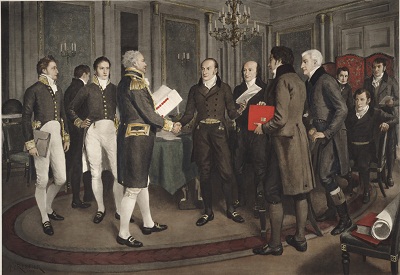Just as the course of the war was influenced by developments in Europe, so, too, were the peace negotiations. The two warring nations sent peace delegations to Ghent in modern-day Belgium for talks that got underway in August 1814. Because the British had scrapped the Order-in-Council shortly after war had been declared, the only major outstanding issue was impressment. By the time the talks began, the United States had dropped this issue, paving a rocky road to peace.
There was growing discontent in Britain over the tax burden. Another year of campaigning was likely to cost £10 million ($49 million).

Courtesy of Toronto Public Library
The British demanded the establishment of an Indian barrier state in the Old Northwest, territorial concessions in northern Maine and present-day Minnesota, the American demilitarization of the Great Lakes, and an end to American fishing privileges in Canadian waters. These demands, which were designed mainly to protect Canada and Britain’s Indian allies from renewed aggression from the south, were what one scholar has called “a probing operation.” Their purpose was to provide a basis for negotiation and to determine what concessions the United States might be willing to make.
When the Americans held firm against these demands, the British offered peace on the basis of uti possidetis, which meant that each side would keep any territory it held when the treaty was signed. If this offer were accepted, the British probably would have bartered away coastal Maine to secure control of a few strategically located forts further west. When the US delegation balked at this offer, the British retreated again and ultimately agreed in the Treaty of Ghent to restore the status quo ante bellum—the state that existed before the war.
The British dropped their demands in part because of the lack of military progress in America. Although buoyed by the occupation of Washington, they soon learned that their forces had withdrawn from New York and given up the assault on Baltimore. There was also growing discontent at home over the tax burden. Another year of campaigning was likely to cost £10 million ($49 million), and this would necessitate continuing the onerous war taxes that were still in place from the French war. No less important was an ominous impasse in the negotiations at the Congress of Vienna, which had convened in September 1814 to forge a peace settlement in Europe. Indeed, at one point British leaders were considering how quickly they could recall troops from the New World to buttress their position in the Old.
When the British ministry asked the Duke of Wellington to take command in America, the “Iron Duke” agreed to do so, but not until the following spring. More importantly, he told the government that it had no right to demand territorial concessions in America without control of the Great Lakes. This opinion gave British leaders all the cover they needed to end the war without any territorial gains.
Part of a series of articles titled The Global Context of the War of 1812 .
Last updated: March 5, 2015
